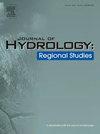利用AgERA5和ERA5-Land再分析数据集,对意大利西西里岛和西班牙朱卡尔河系统的粮农组织Penman-Monteith作物参考蒸散量图进行了高分辨率空间插值
IF 5
2区 地球科学
Q1 WATER RESOURCES
引用次数: 0
摘要
研究区域茹卡河系统(西班牙)和西西里岛(意大利)。penman - monteith作物参考蒸散量(PM-ETo)对灌溉规划和水文建模至关重要。它的估计通常需要密集的农业气象网络和自动化站点。另外,像ERA5-Land和AgERA5这样的再分析数据集提供了空间上全面的数据,但它们的分辨率往往不足。因此,需要空间插值技术来估计未采样位置的PM-ETo。本研究利用气象站记录和ERA5-Land和AgERA5再分析产品三种数据源,采用DRI (Dynamic Regression-Based Interpolation)算法,生成了这两个地区的高分辨率(100 m) PM-ETo地图。并对AgERA5在PM-ETo估计中的性能进行了评价。此外,PM-ETo插值图从三个来源进行了比较。agera5是对ERA5进行了偏差校正的降尺度,与原位数据相比,它有效地消除了西西里岛的偏差,但在juar系统中却没有。尽管如此,对于PM-ETo估计,AgERA5在这两个区域都优于ERA5-Land。在插值之后,生成的地图保留了原始数据集中确定的相同偏差,并保留了地面真值地图的频率分布。这表明该插值方法不会对台站间的下伏气象场产生畸变。所提出的方法为实践者和建模者提供了一个有价值的工具,能够生成高分辨率、准确和实用的PM-ETo地图,以支持灌溉规划和水文应用。本文章由计算机程序翻译,如有差异,请以英文原文为准。
High-resolution spatially interpolated FAO Penman-Monteith crop reference evapotranspiration maps of Sicily Island (Italy) and Jucar River system (Spain) using AgERA5 and ERA5-Land reanalysis datasets
Study region
Jucar River System (Spain) and Sicily Island (Italy).
Study focus
Penman-Monteith crop reference evapotranspiration (PM-ETo) is critical for irrigation planning and hydrological modeling. Its estimation typically requires dense agricultural weather networks with automated stations. Alternatively, reanalysis datasets like ERA5-Land and AgERA5 offer spatially comprehensive data, but their resolution is often insufficient. Spatial interpolation techniques are thus required to estimate PM-ETo at unsampled locations. This study applied the DRI (Dynamic Regression-Based Interpolation) algorithm to generate high-resolution (100 m) PM-ETo maps for both regions using three data sources: meteorological station records and ERA5-Land and AgERA5 reanalysis products. The performance of AgERA5 for PM-ETo estimation was also assessed. Additionally, PM-ETo interpolated maps from the three sources were compared.
New hydrological insights for the region
AgERA5, a bias-corrected downscaling of ERA5, effectively removed bias in Sicily when compared to in situ data, but not in the Jucar system. Nonetheless, AgERA5 outperformed ERA5-Land in both regions for PM-ETo estimation. Following interpolation, the resulting maps retained the same biases identified in the original datasets and preserved the frequency distributions of ground-truth maps. This indicates that the interpolation method does not distort the underlying meteorological fields between stations. The proposed approach offers a valuable tool for practitioners and modelers, enabling the generation of high-resolution, accurate, and practical PM-ETo maps to support irrigation planning and hydrological applications.
求助全文
通过发布文献求助,成功后即可免费获取论文全文。
去求助
来源期刊

Journal of Hydrology-Regional Studies
Earth and Planetary Sciences-Earth and Planetary Sciences (miscellaneous)
CiteScore
6.70
自引率
8.50%
发文量
284
审稿时长
60 days
期刊介绍:
Journal of Hydrology: Regional Studies publishes original research papers enhancing the science of hydrology and aiming at region-specific problems, past and future conditions, analysis, review and solutions. The journal particularly welcomes research papers that deliver new insights into region-specific hydrological processes and responses to changing conditions, as well as contributions that incorporate interdisciplinarity and translational science.
 求助内容:
求助内容: 应助结果提醒方式:
应助结果提醒方式:


